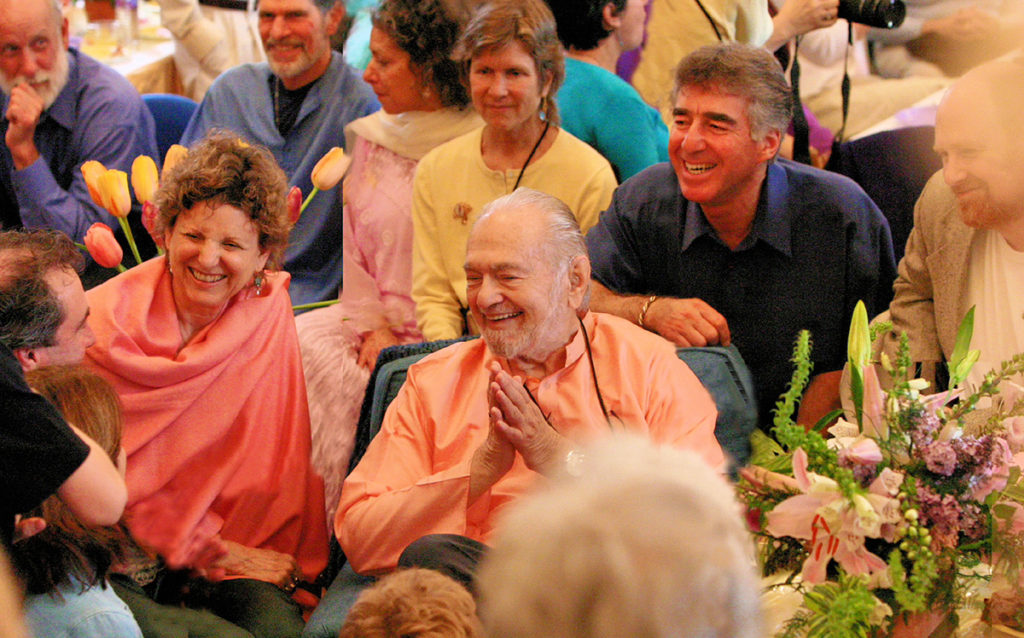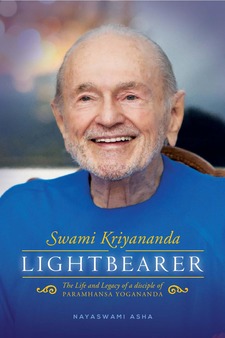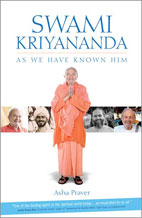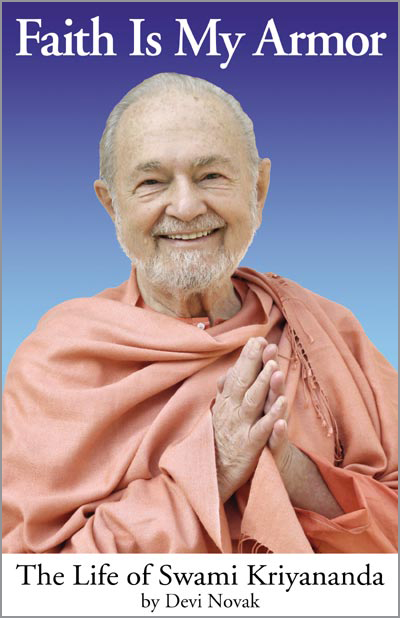
When I was about twenty-four years old – which was quite a while ago – Swami Kriyananda said to me that he wanted me to write the story of his life. And then he added – thank heaven – “But not yet.”
Whereupon for many years I spent a major portion of every day worrying about that book.
Aside from faithfully taking notes of whatever he said and what I observed, I spent the next four decades obsessively thinking about the book. And it was only three or four years ago that I was finally able to set to work in full earnest to try to fulfill Swamiji’s request.
About ten years ago, I made a first attempt to organize my thirty-plus years of notes. And when I finally went to work I was gratified to find that I had boxes upon boxes of files, all neatly arranged in chronological and subject order. And yet it still felt like an overwhelming challenge.

At this point, I’m still not quite finished, but the end is actually in sight, and that in itself is a very great deal to me. So if I seem a little bubbly today, that’s why.
I am feeling fizzy, and I know that you’re going to love the book, because it’s the life of Swami Kriyananda, and it’s a deeply inspiring, epic story.
My anxiety about the project was, of course, quite understandable. I remember Swami saying, of what it was like to write about Paramhansa Yogananda, that if you’re an ant sitting at the base of Mount Everest, you can’t really say a lot about Mount Everest. Because that was how he felt when he had to sit down and start writing about his great guru. And I don’t know what’s smaller than an ant or larger than Mount Everest, but that’s how I felt through all the years that I had this enormous project looming before me. It seemed an insurmountable task – and would I ever be able to do it?
So I procrastinated. And in the meantime I compiled a book called Swami Kriyananda – As We Have Known Him.
But before I even had the thought of writing that book, I remember standing with Swami in the kitchen of his house in Assisi. And he would often say important things rather casually, so that you would be less inclined to panic.
And so he said, in his perfectly casual way, “Why are you not writing?” He said, “Are you too busy? Are you lazy? Are you scared?” And of course I had to reply, “All of the above.”
He said, “Well, you need to start.”
That was in 2003, and I did start to work. I spent the next two and a half or three years working, at the end of which I had nothing – I had literally not a single usable paragraph, because my inner critic was so intensely active that I would spend virtually entire days typing and deleting. And I know that it sounds nuts, but that’s what it was like.
If you’ve criticized a lot of people in your life, which had been an unfortunate tendency of mine, then when it comes your turn to do something creative, you find that there is no universe in which you can possibly get started, because your mind keeps insisting that you have to be absolutely perfect before you can even begin.

I grew up very school-smart, which was something I shared with my brother. It was something we both knew how to do. And between my brother and me, and to a certain extent my sister, although she was a more balanced person than we were, I think our IQ was higher than the rest of the class combined. And of course it didn’t make the slightest difference in the long run, but I didn’t have to put out much effort to do well in school.
People are born knowing how to do certain things because they’ve done them in the past, and being a scholar was something I had done many times, and it just bored me to tears. But I knew how to do it, and when you’re able to be very good at something even though you’re putting out hardly any effort, and everybody is telling you how terrific you are, it makes you a little crazy.
There’s a tremendous sense of faking it all the time, and it can make you a little prickly and defensive. And I believe it’s why I spent three years unable to get started on the book.
Swami and I would often talk on the phone, and at the end of those three years he said, “This is kind of a non-starter.” So he asked Devi to write a biography of him, and she wrote a beautiful book called Faith Is My Armor.
I said to Swami, “Even though I haven’t one usable paragraph, this has been the most terrific period of my life.” Because so much of my karma had come due, and I was able to see that there was probably a better way to be a human being, and how I could work on that. So it was very rich, spiritually. But productive – zero.
And then I began to follow the advice that David had been giving me all along: “Why don’t you just write stories?” Because now that Devi had written a biography, I felt free to do what I was good at, which is telling stories. And that’s when I wrote Swami Kriyananda – As We Have Known Him.

During the three years that I spent flailing away at the book, in my desperation I had written a stream-of-consciousness history, starting with when I met Swami and pouring out all my memories of the last twenty years in a tumbling torrent. Because, as you’ve probably noticed, the words just flow out of me.
So I sat at the typewriter and did that, and I ended up with maybe fifty pages for each year, just pouring it all out in one great flow, and when I showed it to Swami, it was awful.
We were on holiday in Goa, and I think of that period as “purgatory and paradise.” Because Swami decided, not that I was a bad writer, but that he was such a dull human being that no good book could be written about him. Which didn’t make me feel really terrific.
I knew that it wasn’t a good book, but I didn’t know what else to do, because I’d been going around in circles with nothing to show for it.
So here I am, and this is the final stretch. And even though Swami has passed on, those long-ago questions have been very present and real for me: Are you too busy, or are you lazy, or are you scared? And I knew that I had to get back to it.
So I began working, and it was the same huge challenge as before, but only up to the point when I went into seclusion last year, when it all finally started working.
I had thrown away that old manuscript because it was such a painful reminder and because it was a lousy book. And then I accidentally found it on my computer; but the file was badly corrupted, and I had to call on one of our resident computer geniuses who was able to figure out how to rescue it. And now I’m finding that the present book has been greatly enhanced by that old stream-of-consciousness narrative that I’d forgotten. So I’ve been integrating lots of interesting bits and pieces from that older effort, and they’ve made the story a lot richer.
But the fundamental point in all of this is: Why in God’s name do we ever worry about anything?
That’s really the whole point of my story today – why do we ever worry about anything at all?
The mother of all my fears, ever since I was twenty-four, was that I would never be able to write the book, because I knew that I was born to write it.
Swami had said to me, “Master told me that I would have to write about him.” And when he asked me to write about him, he said, “I think it would be easier if it was explicit between us.” Meaning that we would both understand that it was what I would have to do, and that he would help.
That’s how he put it. But he rarely referred to it again. In fact, he almost never said a word about it. And I think it was partly because he knew what I was like – completely conscientious, but forever worrying.
And yet, through all the intervening years, he was constantly talking to me. At first I thought he must be talking to everyone, and it only later did I realize that he was always telling me what he was doing, and why. And now that I’m actually writing about him, it might seem reasonable to ask, how do I know what he was thinking? And the answer is that it’s because he told me.
But through all the time that he was essentially telling me what to put in the book, I was only semi-aware of how he was, in a sense, dictating it to me, bit by bit. So it never crossed my mind to stop worrying. And I’m reminded of the Bible, where the Apostle John says, “And the light shineth in darkness; and the darkness comprehended it not.” (John 1:5)
It’s every bit as simple as that. We are so determined to suffer that no matter how much evidence we get that it’s a complete waste of time, we go on worrying.
Swami takes a lighthearted approach in his commentary on John’s words. He asks, why does the light only shine in the daytime? Does it shine at night? And if the light is shining, why doesn’t it convert the darkness?
But looking at it strictly in terms of our own situation, the answer is clear: “Of course I want the light! Of course I want it to dispel the darkness! Why wouldn’t I want the light? Everybody, including myself, just wants to be happy!”
If at any time in the last forty-eight years someone had said to me, “Honey, just relax!” – which a lot of people actually did say, but not always in helpful tones – I doubt that I’d have been able to hear them.
“Who, me? – I’m not tense! I’m just fine!” And why would I not have listened? Because even though the light was shining before me, the darkness comprehended it not.
Several years ago I compiled a book at Swamiji’s request, called Loved and Protected. It’s three-hundred-pages of stories of miracles and answered prayers.

Swami had originally wanted to write that book himself. He had the idea that if he could gather stories about the wonderful ways God had helped people, it would strengthen people’s faith. So he started on it. And because I had compiled a book of stories about him, and I knew what was involved, I thought, “You aren’t going to be able to do this book.” And at a certain point he handed it to me.
I knew that if you ask people, “Send me your stories,” nobody will respond. And even if they do, they’ll say, “I was in the forest and there was a big light.” And it’s not a good story. Not that they don’t have a lot to say, but most people have trouble putting words on paper.
So I knew that I would have to go out and find the people with stories and talk to them.
I traveled to several of the Ananda colonies, and I got on the phone with lots of people. But mostly I sat with them while they would tell their stories. And I realized that although most of them were people I knew, I didn’t actually know them at all.
I would sit and look into their eyes, young or old, and sometimes the face would be radiant, and sometimes it would look as if it had not been an easy incarnation. And as we sat there eye to eye, they would tell me about something that had happened to them, and how the light had shone in the darkness, and the darkness had comprehended it. And sometimes it was so dramatic that there was no mistaking it – for example, as in the first story in the book.
It’s about a man who’d been a first responder to highway accidents. He was standing on the road at the site of an accident when a car went lost control in the snow and came hurtling at him from fifty feet away. And then he suddenly found himself transported to safety, with no apparent transition.
Because there was fresh snow on the ground, they could see his footprints where he’d been standing when the car spun out of control, and they saw his footprints where he had landed safely, and there were no footprints in between.
A friend of his had been watching, and when the man disappeared he assumed that he’d been so mangled that there was nothing left of him to see. But then he caught sight of him standing safely at a distance from the wreckage, and when the friend who’d supposedly died started calmly walking over, the man who’d been watching became hysterical, and it took them a while to sort it out.
It was one of the most dramatic stories in the book. But there were also stories of small miracles that were deeply meaningful in people’s lives.
A woman described how her father, a clergyman, had been horribly abusive to her as a child. She said, “The miracle of my story is that after an experience like you’d think I’d have turned away from God, but the miracle is that I didn’t.”
She said, “Everything in my life should have turned me away from God, but He never turned away from me, so I could not turn away from Him.”
And yet we insist on unceasingly worrying: Am I good enough? Am I living up to my potential? Will these bad things happen? How will I pay the rent? And it’s just one thing after another.
I found a house in a remote area of northern Washington where I could take a long seclusion and begin writing the book about Swami Kriyananda. It was an ideal situation because it was so far removed from my normal life, and I could concentrate fully on this great project.
So I got in my car at Ananda Village, and I plugged in my iPhone and began listening to the audiobook of Loved and Protected, starting at the beginning and listening to it over and over as I drove. And although I had compiled the book, it didn’t make the slightest difference to the inspiration I felt, because I didn’t actually write the book. I was there, and I put the words on paper, but it wasn’t “mine” by any stretch of the imagination. It was the light shining in darkness, and the darkness comprehending a little bit of the light. And I was moved to tears as I drove down the highway.
When you write a book, you have to read it many times while you’re editing it. So I was very familiar with the phrases, and I knew that every one of the stories would have a happy ending. And when I say “happy,” I don’t mean that everybody lived happily ever after, or that the cancer went away, or that the mother didn’t die. In fact, it was almost always the opposite – the mother died and the cancer remained. So it wasn’t about happy endings in a sentimental or superficial way.
When Swamiji read the book, he said that he was very moved. He said, “I’m so proud of the people at Ananda.” He said that he was particularly moved that when challenges came they had turned, time after time, toward God. And why else are we here?
I’m a little older now, and I would like to start my next life at about age forty-five. I don’t know how it could be arranged, but I often wonder, can’t we just learn a great deal in this lifetime without having to learn it all over again, so that in our next life we can get straight to the point where we have a clue?
Maybe when we’re children next time it will be possible to have a clue. I believe that Swami had a clue as a child, and maybe we can, too. But it would be lovely if we could just get straight to the point where we realize, “Why am I worrying about the small stuff all the time?”
An Ananda member had experienced a difficult trauma, and when she prayed about it she received an intuitive message from Swami Kriyananda. It was an inner voice that said, “Why are you taking this so hard?”
We cling to our difficult experiences. We clutch them to our bosom. “But this is so difficult!” “But you don’t understand!” “But this is a result of my childhood traumas!” “But this is how I grew up!”
We’re so determined not to comprehend the light. We make an absolute profession of it. We’re Oscar-caliber actors at not comprehending the light.
I try not to watch the news, but a friend had read about something terrible that happened, and she wanted to talk about it. So I listened, and I’m sorry that I know about it, because what difference does it make in the long run? Are we actually surprised that this planet is full of truly demonic people? Had we not noticed? And do we think that God isn’t aware?
Is it possible that this planet is the one big “oops” in the cosmos, and that everything else is in perfect order, and it’s just this one little ball that accidentally got a little bit screwed up?
Whether it’s the melting icebergs or the tyrants and terrorists and criminals, did we ever think that there is no such thing as karma? Did we ever think that we would get to live in a place where we would not be challenged, and we would be allowed to coast along?
Why would we even think it would be a good idea? Because the light shineth in darkness, and the darkness can’t comprehend the light.
The only thing we are ever experiencing is the pattern that we’ve created in our own consciousness in response to the things that have happened to us in our countless lives.
You can try to go to bed and not get up and hope that it will all blow over, or that you’ll die. And, well, it isn’t so easy, because after a while you get hungry, or you get a cramp. As a friend of mine said, “Everyone thinks they want to lie down and die – but just try it.”
The thing to remember is that our endless experiences are just that – they’re experiences, and as soon as they happen, they’re gone.
As I look at my notes for the book I’m writing, and as I listen to the miracle stories, I find that the words have a life of their own. I remember writing them down, but I don’t know where they came from. And if it’s a good book, it’s because I finally stopped interfering with what it was trying to be.
When I went into seclusion last year, the book that Swami Kriyananda asked me to write about him finally started telling me what it was supposed to be. Swami started telling me what it should be, and I was finally quiet enough to hear. And until that point, I hadn’t actually been misguided, but I was guessing what it wanted to be. And I was making some pretty good guesses, but then he began to tell me, and I wrote down what he said. And what it implies is that the book was able to create itself because it already existed.
Swami said, “I’m doing a new kind of creativity, and I’m trying to inspire other people to do it.” Where you’re putting forward what is already there. You aren’t creating it, you are merely expressing what’s there already to be expressed.
That’s a simple way of putting it. But the truth is that everything exists already in the ether, and in the will of God. It exists in destiny. And because it’s all happening in the present moment, all you need to do is get quiet enough to know what it is supposed to be.
To return to my previous thought, we have countless experiences over many lifetimes, and after we’ve had them, they are gone, and all that remains is the self-identifications that we’ve formed through our reactions and decisions in response to those experiences.
Our ego-self becomes identified with our actions. And while you can take lots of wonderful classes at Ananda and understand the metaphysics of it, let’s just say that for life after life we’ve been affirming certain patterns, to the point that we’re identified with them, and we call them our self.
We’re walking around with a vibrational pattern that we’ve created by our ego-identifications. And, God knows, the people who did it to you have passed on, or they’re living in some other reality. Yet we cling to the vibrations of consciousness that we’ve created through our reactions to those experiences. And this is all that is ever happening.
But, my, my, it feels so very different and so very real, doesn’t it? And then the light comes and shines in the darkness, and it says, “Pure joy! Pure joy! God loves you. You are fine. It’s going to be all right.” And even if it’s a big mess, it will be all right.
One of my favorite sayings is, “Something always happens.” Not necessarily something better, but something always happens. Here you are, and this is what you’re dealing with, and something else will happen, and you’ll have to deal with it, for better or worse. Meaning that this life will keep going forever. And whether the darkness comprehends the light will depend on how deeply we are clinging to what isn’t there anymore. Except that it is there, because we are vibrating with it.
Now, it doesn’t mean that we can simply jump out of the stream of our past experiences and reactions and what they’ve made us. But it surely makes the problem simpler, because we can realize that it’s entirely a matter of changing our consciousness. And our ability to change our consciousness will depend on whether the darkness will comprehend the light, this time around, or whether we will spend another forty years worrying about whether we’ll be able to write this book.
There I was, three years ago, worrying about the book and pouring out a stream of ideas that looked completely stupid and useless, but that would be revealed, in due time, as a tremendous investment in my positive future. And all of my worrying was for naught, because the book is what it was intended to be.
In an early draft of one of his books, Swami wrote, “The reason I did this is because I’m stupid.” When he shared it with us, I wrote to him, “Swami, you’re a lot of things, but stupid is a really hard one to apply to you.”
I said, “It may have been stupid, but trust me, it doesn’t work in this paragraph.” And he eventually changed it to something more refined.
But we are stupid, and that’s simply how it is. But we don’t have to be, because the light is always shining just behind the darkness.
The Gita says that if a hundred thousand suns were to burst upon the sky and fill the world with light that no one could imagine, it would give us barely a hint of the radiance of the Spirit that is shining behind the darkness.
It’s a marvelous image. And this is why the saints become so tiny in their self-perception. And yet people are constantly trying to tell them, “Well, yes, you may not feel like you’ve done very much, but you were the vehicle for that which you claim you didn’t do!”
People would almost desperately try to paste some grand-sounding egoic reality onto Swamiji, as if they were doing him a favor and helping him. And there was simply no place for it to stick. The other half of the Velcro was missing. Because he had seen the light, and he was living in the light. The darkness had comprehended it fully, and he had no more need whatsoever to be justified, or, as I like to think of it, for somebody to apologize and say that it wasn’t really your fault, and you were simply the victim.
“I know that victim consciousness isn’t good, but if somebody would just acknowledge that I was the victim this one time, in this particular situation, I’d be more willing to let it go.”
We are so crazy. The vrittis, those vortices of consciousness that we’ve stored up in our spines in response to our past experiences, are nuts. They really are stupid. And that’s why the light shines and we fail to comprehend it.
But we aren’t actually compelled to ignore the light. And that’s the wonderful thing. We don’t have to continue to ignore it. And, even better, we will not ignore it in the end.
But this is our story, and if the happy ending hasn’t yet arrived, it simply means that the story hasn’t ended. Because the story will only end when we finally recognize, “Ha-ha, what a joke!”
The last line of Paramhansa Yogananda’s poem, “Samadhi,” says: “A tiny bubble of laughter, I am become the sea of mirth itself.”
I’ve sometimes thought, “Laughter?” “Mirth?” That poem speaks of “volcanic rays of doomsday cataclysms” – and yet, is it really all destined to end in a tiny bubble of laughter?
There’s a recording where Master recites that line, “A tiny bubble of laughter, I am become the sea of mirth itself!” And he exhorts his audience, “Say it with me! Say it again! ‘A tiny bubble of laughter! I am become the sea of mirth itself!’” He repeats it several times, insisting that the audience say it with him. For that is our true reality.
Will all of our incarnations, and all of the vrittis of consciousness in our spine, and all our experiences, be destined to end in a tiny bubble of laughter?
Let us rejoice in the happy ending. And let us remember Lahiri Mahasaya’s exhortation: “Eventually? Eventually? Why not now?!”
God bless you.
(From Asha’s talk during Sunday service at Ananda Sangha in Palo Alto, California on January 21, 2018.)
